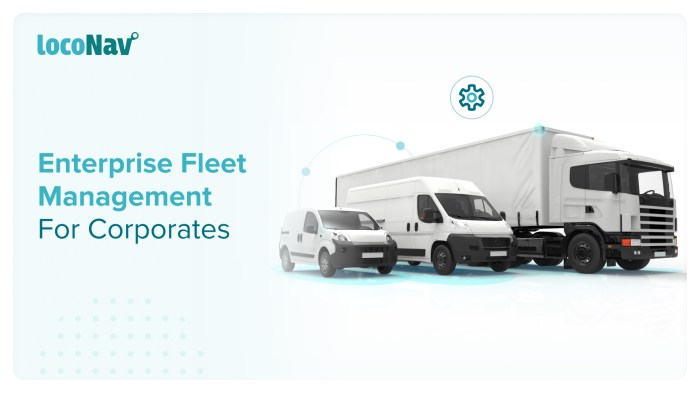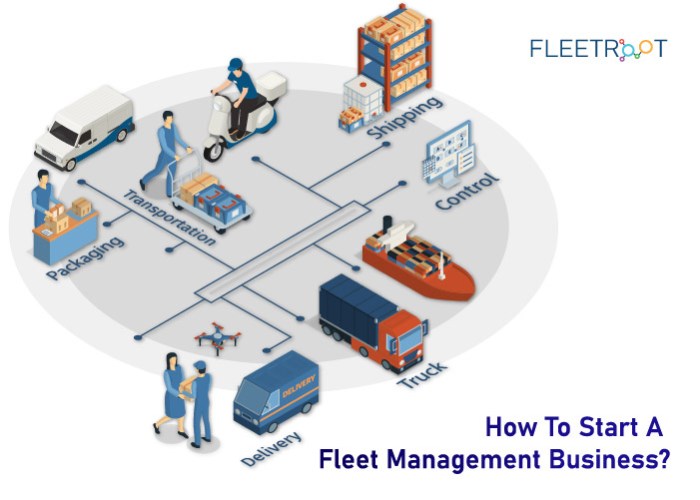
As Commercial fleet management takes center stage, this opening passage beckons readers into a world crafted with good knowledge, ensuring a reading experience that is both absorbing and distinctly original.
Commercial fleet management is a vital component of business operations, encompassing the coordination and oversight of a company’s vehicle fleet. By effectively managing these resources, businesses can streamline their operations, improve safety, and enhance overall efficiency. This field involves various functions such as tracking vehicle performance, optimizing routes, and maintaining compliance with regulations, all aimed at achieving better productivity and cost savings.
Understanding Commercial Fleet Management
Commercial fleet management encompasses the strategic oversight of vehicles utilized by businesses for transporting goods and services. This approach is crucial as it directly impacts operational efficiency, cost management, and customer satisfaction. Companies that rely on fleets—ranging from delivery services to construction firms—can significantly enhance productivity and maintain a competitive edge through effective fleet management practices.Managing a commercial fleet involves various primary functions, each playing a vital role in ensuring that operations run smoothly.
These functions include vehicle acquisition, maintenance scheduling, fuel management, driver management, and compliance monitoring. Each of these components must work harmoniously to optimize the performance and longevity of the fleet while controlling costs.
Key Functions of Fleet Management
Understanding the key functions involved in fleet management helps businesses streamline operations and enhance service delivery. Here are the primary functions:
- Vehicle Acquisition: Selecting the right vehicles based on the specific needs of the business, including size, capacity, and fuel efficiency.
- Maintenance Scheduling: Implementing a proactive maintenance program to minimize downtime and prolong vehicle lifespan, thus ensuring safety and reliability.
- Fuel Management: Monitoring fuel consumption and expenses to optimize routes and reduce costs, often through advanced tracking technologies.
- Driver Management: Training drivers to promote safe driving practices and efficiency, while also monitoring their performance through various metrics.
- Compliance Monitoring: Keeping up with regulations and legal requirements relevant to fleet operations, including safety standards and environmental laws.
Benefits of Effective Fleet Management
Implementing effective fleet management practices provides a multitude of benefits, enhancing operational capabilities across various industries. These advantages include:
- Cost Reduction: Streamlining processes leads to lower operational costs through efficient fuel usage and reduced maintenance expenses.
- Increased Productivity: With optimal routing and scheduling, businesses can maximize deliveries and utilize their vehicles more effectively.
- Improved Safety: Regular maintenance and driver training reduce the risk of accidents, contributing to a safer working environment.
- Enhanced Customer Satisfaction: Timely deliveries and reliable service foster better customer relationships and loyalty.
- Data-Driven Decision Making: Access to real-time data aids in making informed decisions that can lead to further improvements in operations.
“Effective fleet management is not just about keeping the wheels turning; it’s about optimizing every aspect of the operation to drive business success.”
Key Technologies in Commercial Fleet Management
In today’s rapidly evolving transportation landscape, commercial fleet management has embraced various technologies to enhance efficiency, safety, and reliability. These technologies not only streamline operations but also provide valuable insights for better decision-making. From telematics to advanced software solutions, the integration of these tools is essential for modern fleet management.Telematics is a cornerstone technology in the commercial fleet sector. It combines telecommunications, monitoring systems, and vehicular technologies, allowing fleet managers to track vehicles in real-time while gathering crucial data on vehicle performance, driver behavior, and route optimization.
This integration leads to reduced operational costs and improved service delivery.
Software Solutions for Fleet Efficiency and Tracking
A variety of software solutions are available that enhance fleet management capabilities, providing tools for monitoring, analysis, and reporting. These solutions are critical for optimizing fleet operations and improving overall efficiency. The following software solutions are widely utilized in commercial fleet management:
- Fleet Management Systems (FMS): Comprehensive platforms that integrate various functions such as vehicle tracking, maintenance scheduling, and fuel management.
- Route Optimization Software: Tools that analyze traffic patterns and vehicle availability to determine the most efficient routes.
- Driver Management Software: Solutions focused on assessing driver performance, providing training resources, and tracking compliance.
- Maintenance Management Software: Applications that help schedule and track vehicle maintenance, ensuring optimal vehicle performance and longevity.
- Fuel Management Systems: Software designed to monitor fuel consumption, improve efficiency, and reduce costs associated with fuel usage.
These software solutions significantly contribute to enhanced fleet performance, enabling managers to make informed decisions based on data-driven insights.
The Role of Telematics in Fleet Performance and Safety
Telematics plays a vital role in improving both fleet performance and safety. By integrating GPS and onboard diagnostics, telematics systems provide real-time data on vehicle location, speed, fuel efficiency, and more. This data is crucial for evaluating driver behavior, identifying areas for improvement, and ensuring compliance with safety regulations. Key benefits of telematics in fleet management include:
- Real-time tracking that allows managers to monitor vehicle locations and optimize routes on-the-go.
- Driver behavior analysis, which helps identify risky driving patterns, leading to targeted training programs.
- Enhanced maintenance scheduling through predictive analytics that alerts managers before problems escalate.
- Improved fuel efficiency by monitoring consumption patterns and identifying opportunities for better driving practices.
- Increased safety through features like geofencing and automated alerts for unauthorized vehicle usage.
Implementing telematics not only leads to operational efficiencies but also fosters a culture of safety and accountability among drivers, thereby driving long-term success for commercial fleets.
Best Practices for Effective Fleet Management

Managing a commercial fleet effectively is crucial for ensuring operational efficiency, cost-effectiveness, and compliance with industry regulations. Implementing best practices can streamline processes, enhance safety, and optimize resource utilization. This section delves into strategies that can help fleet managers maintain their vehicles and operations efficiently while also focusing on sustainability and compliance.
Strategies for Optimizing Fuel Consumption and Reducing Operational Costs
Fuel consumption has a direct impact on the operating costs of a commercial fleet, making it essential for fleet managers to adopt effective strategies to optimize fuel efficiency. Implementing the following practices can lead to significant savings and environmental benefits:
- Regular Maintenance: Scheduled maintenance ensures vehicles operate efficiently. This includes regular oil changes, tire rotations, and filter replacements.
- Driver Training: Providing training for drivers on fuel-efficient driving techniques can reduce fuel consumption by up to 20%. This includes smooth acceleration and braking, maintaining steady speeds, and minimizing idling time.
- Route Optimization: Utilizing GPS and route planning software can help in identifying the most efficient routes, thereby reducing travel time and fuel usage.
- Telematics: Implementing telematics systems allows fleet managers to monitor vehicle performance and fuel usage in real-time, leading to informed decision-making and timely interventions.
Methods for Ensuring Compliance with Industry Regulations and Safety Standards
Compliance with industry regulations and safety standards is non-negotiable for commercial fleet operators. Knowing and adhering to these regulations not only avoids penalties but also promotes a culture of safety within the organization. The following methods can help ensure compliance:
- Regular Audits: Conducting regular internal audits of driver logs, maintenance records, and safety practices helps identify areas for improvement and ensures adherence to regulations.
- Keeping Updated with Regulations: Being aware of local, state, and federal regulations is crucial. Fleet managers should subscribe to industry newsletters and attend relevant workshops to stay informed.
- Implementing Safety Programs: Establishing safety programs that include training, safety equipment checks, and emergency procedures enhances compliance and reduces the likelihood of accidents.
- Record Keeping: Maintaining accurate and accessible records of vehicle inspections, driver training sessions, and incidents fosters a transparent compliance environment.
“A well-managed fleet optimizes resources, enhances safety, and drives down costs, creating a sustainable business model.”
Closing Summary

In conclusion, effective Commercial fleet management is essential for maximizing efficiency and profitability in any business reliant on transportation. By implementing the right technologies, adhering to best practices, and continually assessing fleet performance, companies can not only reduce operational costs but also ensure safety and compliance, ultimately leading to sustained success in a competitive landscape.
Query Resolution
What are the key benefits of fleet management?
Key benefits include improved efficiency, reduced operational costs, enhanced safety, and better compliance with regulations.
How can technology improve fleet management?
Technology can enhance tracking, optimize routes, and provide real-time data for performance analysis.
What role does telematics play in fleet management?
Telematics provides crucial insights into vehicle performance and driver behavior, helping to improve safety and efficiency.
What are some best practices for maintaining a fleet?
Regular maintenance checks, efficient route planning, and driver training are essential best practices.
How can I reduce fuel consumption in my fleet?
Implementing route optimization and regular vehicle maintenance can significantly reduce fuel consumption.





